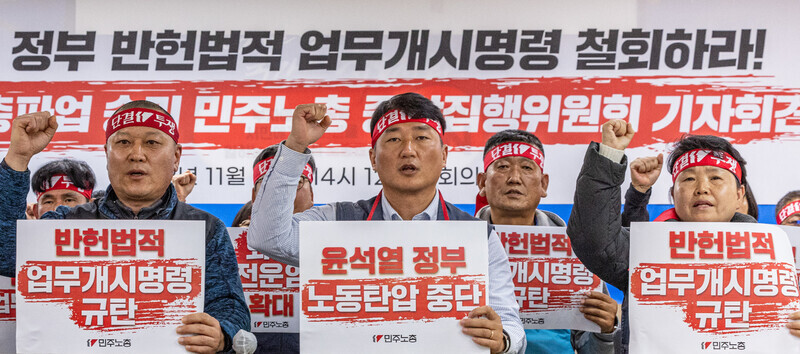hankyoreh
Links to other country sites 다른 나라 사이트 링크
[Guest essay] Is the Korean trucker strike illegal?


1. Company A announced a plan to reduce its labor force citing management difficulties. The laid-off workers who worked for Company A for decades experienced extreme difficulties in finding re-employment. Many of them were forced to work low-wage day jobs, suffering economic losses that reduced their monthly income while others went bankrupt because they couldn’t repay their loans.
Can these workers shift responsibility onto the CEO of Company A for their reduced income and bankruptcy and claim the CEO’s actions were illegal? This is obviously nonsense.
2. Customers who were dissatisfied with Company B’s consumer policy formed a consumer organization and started a boycott. As a result, Company B suffered great financial damage.
Can Company B claim that the consumers who boycotted them have committed illegal actions? This sounds absurd.
3. Individual businesses with business relations with Company C refused to work as a group, demanding better terms and conditions of business in a sort of strike. It led to issues with Company C’s sales, causing losses for the company, the consumers of its products, and ultimately the national economy.
Can the people who took part in the strike be seen as having violated the law?
This time, the question is not so far-fetched. The issue is still happening at this moment, in the form of the Cargo Truckers’ Solidarity Division (TruckSol) strike.
No sooner did TruckSol begin its strike than the administration and ruling People Power Party (PPP) started insisting it was an illegal action.
“There is nothing to be gained from a strike,” said South Korean President Yoon Suk-yeol. PPP policy committee chair Sung Il-jong called it a “chilling incitement of the destruction of the state” and stressed that “illegal acts will not be tolerated.
PPP interim leader Chung Jin-suk called it an “illegal strike that holds the South Korean economy and public hostage.” PPP floor leader Joo Ho-young said he hoped the administration would “respond firmly to illegal actions according to law and principles without backing down an inch.”
In the end, Yoon moved on Tuesday to invoke a work start order meant to stop the strike by force. “We cannot compromise with illegal actions,” he declared.
To say that illegal actions happened during a strike is a very different thing from saying the strike itself was illegal. The administration and PPP have been playing up the fact that 12 strike participants are being investigated for assault and property damage, along with the growing burden the strike creates for the economy.
But that alone is not a basis for declaring an entire strike by 25,000 people to be “illegal” and stopping it by force. The key question in determining the legality of a strike is whether the act of workers physically occupying the means of production that a company possesses can be viewed as a lawful dispute approach.
For striking workers, the occupation of property is the most effective means of pressuring a company. The companies have responded in turn with demands for astronomical amounts in damages. The administration and PPP are fiercely at odds with the opposition parties over so-called “yellow envelope law” legislation that would restrict these damage claims by businesses.
But in the case of the TruckSol strike, there is no “occupation” taking place that would present cause for a debate over property right infringements. The members of TruckSol, most of whom are individual vehicle owners, have undertaken an “honest” strike where they have simply stopped operating those vehicles.
The word “strike” simply means any form of demonstration that involves the refusal to work. In this case, it’s a demonstration where the workers are refusing to employ their own private property for certain duties.
This aspect can be understood not just in terms of labor rights, but also from a market economy perspective. How can it be “illegal” for me to refuse to use my own vehicle to work?
What exactly constitutes a “lawful” strike? Does it have to be one that involves no violence or disturbances of any kind and that causes no direct or indirect losses to anyone?
If that’s the definition, there’s no such thing as a “lawful” strike. By the same standard, there would also be no lawful layoffs, lawful boycotts, or lawful World Cup cheering in the streets.
Just as we are all free to work for our own benefit, we also have the freedom not to work for our own benefit. No matter how scary you make things sound with phrases like “national economic crisis,” “national distribution paralysis,” “incitement of national destruction,” or any other thing you want to put “national” in front of, it cannot be illegal to refuse to work when the conditions are not acceptable.
The striking workers who refuse to comply with the administration’s work start order will now be subject to criminal punishment. The strike itself isn’t illegal — but the administration has “made” it illegal.
Previously, Yoon said he would not become deeply involved in TruckSol’s demands for safe rates legislation, which he dismissed as a “labor-management issue.” But once the strike actually began, he involved himself more quickly and deeply than anyone.
One has to wonder what kind of country the “free nation” that the president so often talks about really is.
A country that presents the “free nation” line whenever the public asks for rights, only to resort to physical force to stop any attempt by the public to fight for those rights, is not just a country that grants freedoms only halfway — it is a country that represses freedoms.
Please direct questions or comments to [english@hani.co.kr]

Editorial・opinion
![[Column] Season 2 of special prosecutor probe may be coming to Korea soon [Column] Season 2 of special prosecutor probe may be coming to Korea soon](https://flexible.img.hani.co.kr/flexible/normal/500/300/imgdb/original/2024/0426/3317141030699447.jpg) [Column] Season 2 of special prosecutor probe may be coming to Korea soon
[Column] Season 2 of special prosecutor probe may be coming to Korea soon![[Column] Park Geun-hye déjà vu in Yoon Suk-yeol [Column] Park Geun-hye déjà vu in Yoon Suk-yeol](https://flexible.img.hani.co.kr/flexible/normal/500/300/imgdb/original/2024/0424/651713945113788.jpg) [Column] Park Geun-hye déjà vu in Yoon Suk-yeol
[Column] Park Geun-hye déjà vu in Yoon Suk-yeol- [Editorial] New weight of N. Korea’s nuclear threats makes dialogue all the more urgent
- [Guest essay] The real reason Korea’s new right wants to dub Rhee a founding father
- [Column] ‘Choson’: Is it time we start referring to N. Korea in its own terms?
- [Editorial] Japan’s rewriting of history with Korea has gone too far
- [Column] The president’s questionable capacity for dialogue
- [Column] Are chaebol firms just pizza pies for families to divvy up as they please?
- [Column] Has Korea, too, crossed the Rubicon on China?
- [Correspondent’s column] In Japan’s alliance with US, echoes of its past alliances with UK
Most viewed articles
- 1AI is catching up with humans at a ‘shocking’ rate
- 2[Column] Season 2 of special prosecutor probe may be coming to Korea soon
- 3‘We must say no’: Seoul defense chief on Korean, USFK involvement in hypothetical Taiwan crisis
- 4Is Japan about to snatch control of Line messenger from Korea’s Naver?
- 5The dream K-drama boyfriend stealing hearts and screens in Japan
- 6Amnesty notes ‘erosion’ of freedom of expression in Korea in annual human rights report
- 7Up-and-coming Indonesian group StarBe spills what it learned during K-pop training in Seoul
- 8[Column] Action on climate change isn’t driving inflation – fossil fuels are
- 9[Column] ‘Choson’: Is it time we start referring to N. Korea in its own terms?
- 10Korea sees more deaths than births for 52nd consecutive month in February